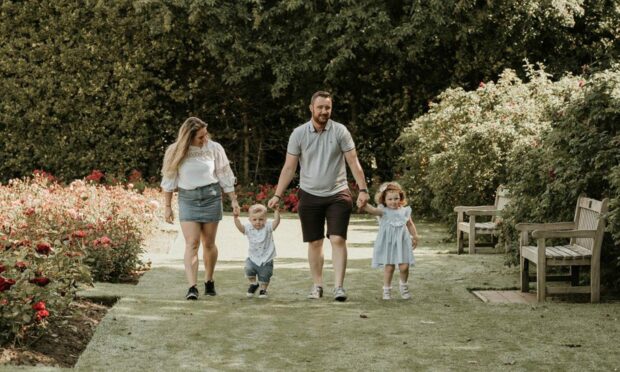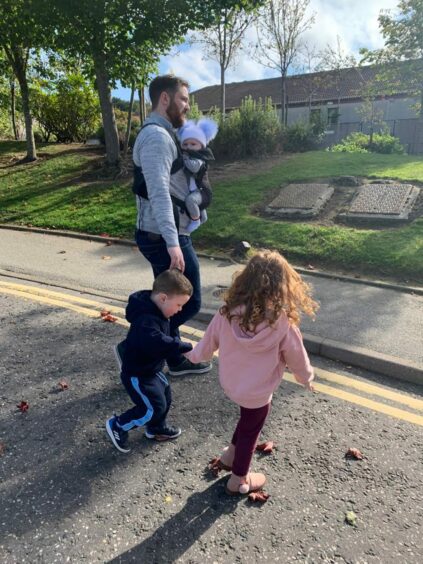Striking a work-life balance is a challenge regardless of career, and trying to do so as a parent only creates new obstacles.
A recent survey by Fathers Network Scotland shows that many Scottish dads have actually been enjoying more time with family since the pandemic.
Roughly two-thirds (67%) of dads are spending 10 or more hours per week playing or supporting their children’s learning. For dads with children under 3, that increased to more than 80%.
But while more dads now try to prioritise family time, they feel they are struggling to strike the right work-life balance.
Long hours, extra hours, shift work and travel are among the problems which led 60% of all working dads to tell researchers that they struggled to balance work and family life. And the cost of living crisis has only added to the pressure to spend more time at work.
To try to regain that work-life balance, dads are making a case for more paternity leave and more flexible working hours.
We sat down with a local dad who shared with us the ways he and his family make time for work and life, without anyone having to shoulder the burden and without sacrificing family time or personal time.
Striking the balance
Ruari Collinson is a swimming development officer for Aberdeenshire Council. His wife, Laura, is a senior lead at a local nursery.
One of the perks of Ruari’s job is that it comes with flexi-time, and he is able to condense his hours between Monday and Thursday and so be available Friday for childcare.
But not everyone gets that luxury, he said.
“It depends on what you do and what your hours are. Previously, I was shift-work, and it was a lot more difficult to balance find that family and work balance.
“With shift work, you’re set to work and so you have to work. And when you have late nights as well don’t help. You’re potentially coming home when they’re already in bed and then the next day it’s difficult to get up early with them.”
Not all fun and games
But even the flexibility that he has with his new position comes with challenges.
“You have that flexibility and it’s great, but you don’t want to be taking advantage of it. I don’t want to have to use it too often, and I think that’s what I struggle with more often.
“You feel guilty sometimes. It’s great to have it but you don’t want to use it, or get into a routine where you’re having to make up time.”
The nature of his job compared to Laura’s makes it more sensible for Ruari to be the one to use the flexibility available to him. But that can cut both ways he said.
Sometimes he feels like his work isn’t as important, since he’s more likely to drop work and respond to the family. But from Laura’s perspective, if Ruari’s always dropping work to be with the kids, it means she’s missing out.
“She doesn’t want to have to constantly rely on me or never be able to be there for the kids.”
It takes a village
Ruari and Laura have three children. They’re both able to make adjustments to work when needed to care for them. But as the old saying goes, it takes a village to raise just one child.
“Both of our parents are very supportive with childcare,” Ruari said. “It gives us some more flexibility which is huge for our family.”
He said that they’re often able to share the load during school holidays. Each set of grandparents might take the children for a day during the week; Ruari can work from home on occasion, in addition to his free Fridays; and then Laura may need to take a day of annual leave.
While the system works, Ruari said they’re looking into joining a kids club or some other form of out-of-school care.
“It’s great to have that support system, but you don’t want to overly rely on it just in case something falls through.”
Paternity leave and flexible hours can benefit the whole family
Striking a work-life balance with older children is difficult enough, but it can be even more important to find time with children at the very beginning.
Ruari said that he’d like to see more paternity leave available in Scotland. After three kids, he learned one thing for certain:
“Two weeks is not enough,” he said. “Obviously I’ve done it three times now, and every time I’ve got my two weeks I’ve taken an extra week of family leave.
“It’s not only for the mother and giving her support, it’s for the father to feel supported. And it’s especially important if you’ve got multiple kids.
“You need to find that balance between new arrival and your kids, helping them transition into the fact that things have changed quite drastically.”
Ruari was just one of 270 dads to respond to the Fathers Network survey. More than 60% of respondents said they struggled to balance work and life, and another 31% said that these pressures have impacted their relationships with their partners.
Employers have a role to play
Cathy Sexton, Director of Fathers Network Scotland, said that employers can step in and make a difference without waiting for government policy to change.
“Dads up and down the country are giving their all for their kids and for their employers and unless we take action, something will have to give.
“The evidence from our report suggests that, sadly, what will give is either their relationships or their mental health.
“This can’t be allowed to happen.
“We need to support all families right from the start and two weeks’ paid paternity leave is simply not enough. It is bad for parents, bad for children and bad for society.
“Although it is encouraging to see more employers adopting family-friendly flexible policies, the culture within workplaces still often assumes that mum is the primary caregiver.
“This is unfair to both mums and dads, and employers need to realise that to get the best from their workforce they need to support all parents and caregivers equally.”




Conversation